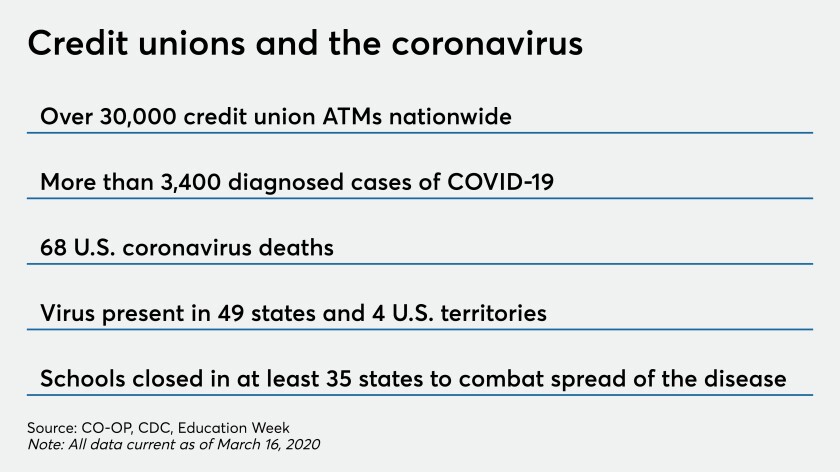ATMs — already questionably clean in the best of times — could be making it even harder to fight the coronavirus.
A 2019 study from LendEDU found that the average financial institution’s ATM is cleaner than a McDonald’s door handle but dirtier than a New York City subway pole. While that could be alarming under normal circumstances, the coronavirus pandemic is raising new fears about how well banks and credit unions are cleaning and monitoring their equipment.

The author of that study isn’t particularly confident things have improved in the year since its release.
"My guess would be that if we ran the exact same test [in the wake of the coronavirus outbreak], the results would look very similar in that everything is still very dirty,” said Mike Brown, a research analyst at LendEDU.
“In terms of how it relates to coronavrius,” he added, “the data should just serve as a warning that everything we touch and interact with daily, especially our money, is very dirty and contains a lot of germs. Because of this, we should always be practicing good hygiene and using sanitizer and washing our hands. The fact that there is now a major virus circulating the U.S. should double your awareness and cautiousness in regards to practicing good health as it relates to handling dirty money.”
That echoes sentiments from other analysts, who have said one of the easiest steps to pandemic preparation could simply be to improve cleaning procedures at the branch.
“ATMs, as far as we know — and we’re certainly not the experts on communicable diseases — are going to be as much at risk as anything else you might encounter out shopping or going about your daily business,” said David Tente, executive director for the U.S. and the Americas at the ATM Industry Association.
Part of the issue, he explained, is that while bank and credit union staffs may be able to clean on-site ATMs and interactive teller machines, off-site equipment, such as branded ATMs in convenience stores, may not be attended to as regularly or as rigorously.
ATMIA issued a statement on its website about the outbreak but it’s unclear whether many of the major ATM manufactures and servicers who work with credit unions are providing guidance. Representatives from Diebold Nixdorf and Dolphin Debit both declined to be interviewed for this story while NCR did not respond to a request for comment.
CO-OP Financial Services, which coordinates the nation’s largest shared ATM network for credit unions, is offering some guidance to credit unions. The company said in a statement it recommends following the National Credit Union Administration’s pandemic planning guide along with monitoring ATM activity, as well as looking into emergency cash availability.
“Yes, it helped, but how much?”
While there are some similarities to the swine flu outbreak in 2009, this is new territory for most credit unions and leaders said they are doing their best to stay on top of the situation.
Pioneer Federal Credit Union in Mountain Home, Idaho, took precautions even before COVID-19 hit. The state was one of the last in the nation to see a diagnosed case of the coronavirus. Tracey Miller, VP of operations, said while Pioneer relies heavily on mobile and web-based video banking, it has also invested heavily in interactive teller machines, which she said could put it in a better situation than some other shops as the disease continues to spread.
Pioneer has ITMs in all but two of its locations and Miller said that management was “definitely prepared” for an uptick in usage. But that also includes the possibility that infected members could pass germs onto the machines, so increased cleanings of all ATMs and ITMs are in the works.
“We try to make the machines clean anyway because it’s a presentation thing. If our machines are dirty, why would you want to come see us anyway?” she asked. “We see it as part of the branch structure.”
ATMs and ITMs are wiped down and disinfected at least once or twice per day, and all machines have been tested to ensure that touch screens will work with surgical gloves or a stylus, should members elect to interact with them that way. Many of Pioneer’s ITMs are set up as drive-thru facilities, but two are in-branch and have small sterilized wipes next to them so members can wipe down touch screens and handsets before using them.
But Miller noted that given current public-health concerns and nationwide runs on products like toilet paper, hand sanitizer and baby wipes, there may only be so much the credit union can do.
“I think at this point if we tried to put gloves out there to help the members wipe down the screen it’s probably not going to be there when we need it because we just have no lockdown system,” she said. “The best we can do is try to keep them as clean as possible and remind members you can use your own gloves or a stylus that you can disinfect afterward.”
Gene Pranger, CEO of POPio video banking and a founder of uGenius, an early booster of ITM technologies, suggested contagion at ATMs and ITMs has always been a concern. While some FIs attempt to mitigate that by placing sanitizers nearby, that’s dependent upon whether those products are even available.
Self-service machines are “a logical source to go to [for service during the pandemic] but you may want to carry some sanitizer with you,” he said.
Daniel Berry, CEO at Duke University Federal Credit Union in Durham, N.C., said his credit union is doing all it can, but there may only be so much CUs can do.
“To be perfectly honest, if the first person after the cleaning has the virus, there’s still a risk there,” he said. “Same as if somebody cleans down the [teller counter] and the next person has the virus. Yes, it helped, but how much? Unfortunately we don’t know.”

